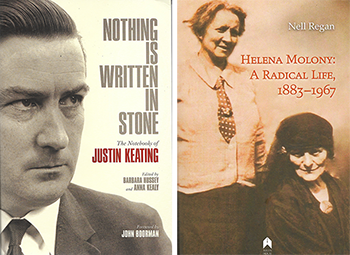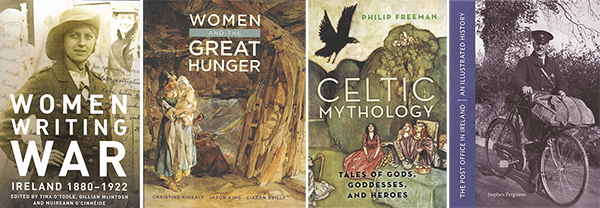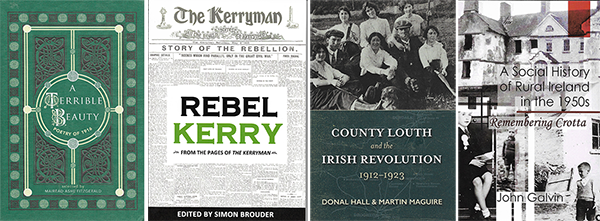BOOKWORM
Published in Book Reviews, Issue 4 (July/August 2017), Reviews, Volume 25By Joe Culley
Barbara Hussey and Anna Kealy (eds), Nothing is written in stone: the notebooks of Justin Keating (Lilliput Press, €20 pb, 280pp, ISBN 9781843516774).
Nell Regan, Helena Molony: a radical life, 1883–1967 (Arlen House, €27 pb, 275pp, ISBN 9781851321650).
Tina O’Toole, Gillian McIntosh and Muireann Ó Cinnéide (eds), Women writing war: Ireland 1880–1922 (University College Dublin Press, €27 pb, 160pp, ISBN 9781910820117).
Christine Kinealy, Jason King and Ciaran Reilly (eds), Women and the Great Hunger (Quinnipiac University Press, $25 pb, 234pp, ISBN 9780990945420).
Philip Freeman, Celtic mythology: tales of gods, goddesses, and heroes (Oxford University Press, £20 hb, 238pp, ISBN 9780190460471).
Stephen Ferguson, The post office in Ireland: an illustrated history (Irish Academic Press, €26.99 hb, 403pp, ISBN 9781911024323).
Mairéad Ashe Fitzgerald (ed.), A terrible beauty: poetry of 1916 (O’Brien Press, €14.99 hb, 160pp, ISBN 9781847173591).
Simon Brouder (ed.), Rebel Kerry: from the pages of The Kerryman (Mercier Press, €15.29 pb, 191pp, ISBN 9781781174784).
Donal Hall and Martin Maguire (eds), County Louth and the Irish revolution 1912–1923 (Irish Academic Press, €19.99 pb, 298pp, ISBN 9781911024569).
John Galvin, A social history of rural Ireland in the 1950s: remembering Crotta (Cambridge Scholars Publishing, £24.99 hb, 208pp, ISBN 9781443844932).
 ‘It is a point of honour not to remain “true to my beliefs”. On the contrary: the honour lies—if you show me better—in changing.’ This seems to have been the guiding philosophy of Justin Keating, Labour Party politician, scientist, journalist, veterinarian, educator, television pioneer, farmer, humanist and general all-round radical. By the early 1980s Keating had stepped aside from the public stage, in large part owing to illness, but his powerful intellect would not be stilled, and his thinking—his ‘paradigm’, as he called it—continued to evolve.
‘It is a point of honour not to remain “true to my beliefs”. On the contrary: the honour lies—if you show me better—in changing.’ This seems to have been the guiding philosophy of Justin Keating, Labour Party politician, scientist, journalist, veterinarian, educator, television pioneer, farmer, humanist and general all-round radical. By the early 1980s Keating had stepped aside from the public stage, in large part owing to illness, but his powerful intellect would not be stilled, and his thinking—his ‘paradigm’, as he called it—continued to evolve.
The title, Nothing is written in stone: the notebooks of Justin Keating, is unavoidably slightly misleading: ‘notebooks’ seems to suggest that we will be delving into a diary he kept throughout his life. Not so. Instead, in early 2006, three years before his death, he began writing. It is not exactly a memoir but more an examination, or reappraisal, of all his beliefs and how he came to hold them.
Keating is a stylish writer, and the conversational tone makes you feel as if you are in very good company indeed. And there is plenty of room for argument, and humour. I particularly like his take on Marx: Keating was a Marxist in the sense that, if Karl were around today, Justin would be happy to explain to him how Marxism would best work. ‘Marx was too early’, in that he missed the revolution of Einstein. You’ll have to read it.
Among the issues he addresses are charges of anti-semitism—‘I am anti-Zionist because I am pro-Jewish’—as well as education, the environment and globalisation.
Keating died on the last day of 2009. On his headstone, which is stone, is engraved ‘Nothing is written in stone’. It makes you think—which is, I suspect, what Keating always wants you to do. A terrific read.
Poet and writer Nell Regan’s long fascination with her subject has culminated in a full biography, Helena Molony: a radical life, 1883–1967. Molony was a journalist, an Abbey actress, a confidante of James Connolly and a committed trade unionist and feminist. I confess I was surprised to learn that she also suffered terribly from alcoholism. And she found herself caught up in association with the German spy Herman Goertz. Regan writes well and presents a fully rounded portrait of a remarkable woman. Long overdue.
Women writing war: Ireland 1880–1922 is a collection of academic papers which, as the title suggests, examines the neglected and often simply forgotten written work of women on war and conflict. Topics include Winifred Letts’s First World War poetry, the political rhetoric and experiences of Anna Parnell and Anne Blunt during the Land War, the cultural nationalism of northern Protestant ‘New Women’ of Antrim, Una Ni Fhaircheallaigh’s Irish-language activism in and beyond the Gaelic League, and Emily Lawless’s Boer War diary.
On a similar theme, Quinnipiac University has produced Women and the Great Hunger, which examines the various roles women played—for example, as landowners, relief-givers, philanthropists, proselytisers and providers for the family—during that fateful period. Quinnipiac is home to Ireland’s Great Hunger Institute, and we have often raved about its gorgeously illustrated and beautifully written Famine Folio series. So it is remarkable that this otherwise impressive volume doesn’t contain a single illustration, although the scholarship is, as always, excellent. Along with traditional sources, the contributors also draw on folklore and popular culture.
You may have read in our previous issue Angela Bourke’s glowing review of Mark Williams’s Ireland’s immortals: a history of the gods of Irish myth. Bourke wrote that modern scholarship had shown that, ‘far from “sneaking” secular material into their manuscripts, monastic writers in the earlier period were reconfiguring the deities of indigenous tradition “as ideological personifications compatible with Christian learned culture”’. Now Philip Freeman, an American academic, has attacked the subject in a most unacademic, reader-friendly introduction with Celtic mythology: tales of gods, goddesses and heroes. With modern scholarly thinking in mind, he retells (or relates, as Flann might have it) the familiar tales of the Book of Invasions, the Táin Bó Cúailnge and Ulster cycle, the Welsh Mabinogi, and the Christian mythology of Saints Patrick, Brigid and Brendan. It includes a good glossary and only the most basic notes.
Stephen Ferguson, an official with An Post and the curator of its museum, has produced the monumental hardback The post office in Ireland: an illustrated history. Ferguson goes right back to the sixteenth century and the appointment of Nicholas Fitzsymonds as the first postmaster of Dublin, and carries on through mail-coaches, packet-ships, the telegraph and telephone and on to the National Lottery. Along the way, the stories of the men and women who built the office provide a colourful social history of Ireland through four centuries. There are many fine illustrations, and Ferguson has an easy prose style. A treat for aficionados.

Simon Brouder, a journalist with the paper, has edited Rebel Kerry: from the pages of The Kerryman. The paper, which began as recently as 1904, was from the start staunchly republican. Brouder, along with contributors such as T. Ryle Dwyer and Hélène O’Keeffe, gives accounts of all the significant events in the county from the Rising to the end of the Civil War. The focus is largely on military matters, including the chaotic attempt to land arms from the Aud, the death of Thomas Ashe, the Free State landings at Fenit and elsewhere during the Civil War, and the still astonishingly grim reprisal atrocities of March 1923, including Ballyseedy. Contemporary reports from the paper are included.
County Louth and the Irish revolution 1912–1923 is the first proper history of the time and place. Among the essays on topics such as Cumann na mBan, policing, the labour movement and the Civil War is an engaging sidestep in ‘“Playing the rebel”: propaganda and amateur dramatics’.
‘Poetry had a long history of living underground in the Gaelic tradition, and dreams of nationhood and the longing for freedom found expression in a particular way in poetry.’ So writes Mairéad Ashe Fitzgerald, who has edited A terrible beauty: poetry of 1916, a slim hardback. Along with the usual suspects, there are also selections from Padraic Colum, Francis Ledwidge, Eva Gore-Booth, James Stephens, Dora Sigerson Shorter and Seán O’Casey.
John Galvin, a retired teacher, has written a memoir of his childhood in north Kerry, A social history of rural Ireland in the 1950s: remembering Crotta. Not so long ago and yet a different time.

















